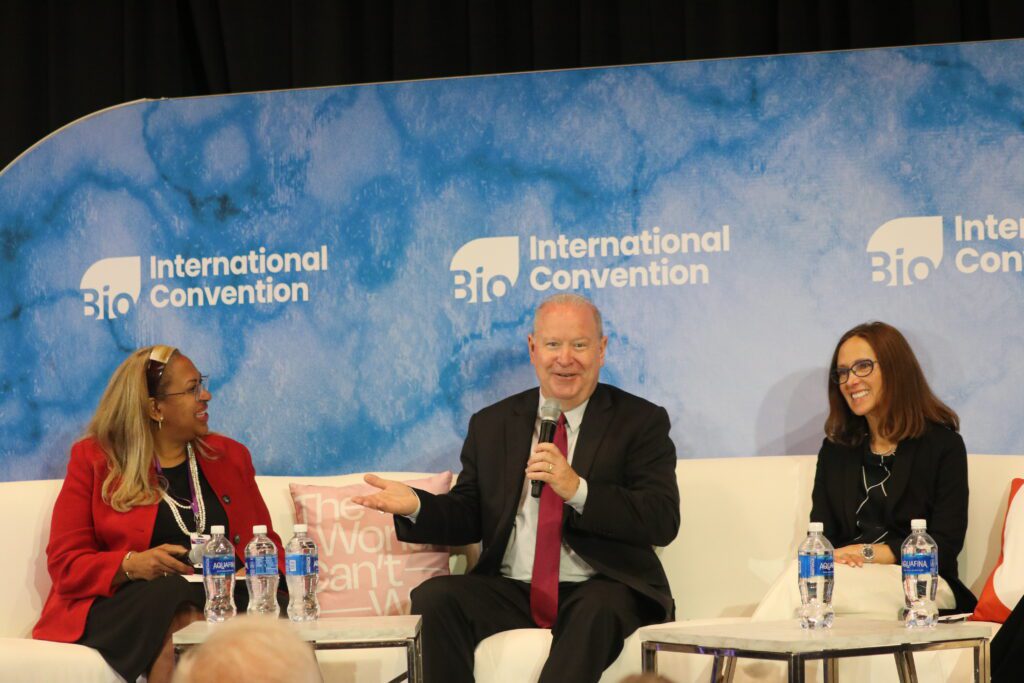Public health advocates are reevaluating the vaccine landscape, revisiting long-held assumptions about vaccine policy during both public health emergencies and periods of relative calm.
“Obviously, we all, as a globe, lived through one of the most horrible pandemics we’ve seen,” said Phyllis Arthur, MBA, Executive Vice President & Head of Healthcare Policy and Programs at the Biotechnology Innovation Organization (BIO), on June 17 at the BIO International Convention in Boston.
“We worked together to try to get out of that pandemic. We had Operation Warp Speed, we had the start of the GAVI interventions, and we did a lot to make products that actually helped to save lives, to prevent death, and bring us through COVID,” Arthur continued. “At the same time, a lot of mistakes may have been made. And I think it was important to think through how we communicated. How did we actually use evidence and apply evidence to the issue of responding to a pandemic, to leveraging vaccines, to using systems for vaccines?”
Her comments framed a June 17 panel, “Shifting Attitudes Toward Vaccines Among Lawmakers,” on Day 2 of the Convention.
Former Member of Congress Larry Bucshon, M.D., speaking at BIO 2025 in Boston
When it comes to vaccines, all politics should be local
“Aggressive debate is good in science,” responded former Member of Congress Larry Bucshon, M.D., Senior Policy Advisor at Holland and Knight LLP, “but bringing in politics and elections is not.”
“I think one of the biggest mistakes that everyone on both sides of the aisle made was politicizing vaccinations,” added Bucshon. “2020 was an election year, and – I understand, I’m a politician, but from a medical perspective – I think it was a dangerous precedent to use public health as a political tool on both sides of the aisle to try to win elections. And unfortunately, that did happen.”
In the post-COVID era, vaccines are discussed in the context of politics. But in Bucshon’s view, there are opportunities to change that.
“The people that lawmakers listen to the most are the people they represent,” he said. Working with communities and community leaders to educate and empower is a critical first step. “The best messengers on public health can be local people, local officials, and local physicians,” he continued.
Luciana Borio, M.D., Senior Fellow for Global Health at the Council on Foreign Relations, echoed his sentiments.
“Over and over again, we’ve seen the importance of the local communicator and the local leadership,” she said. “Even overseas during the Ebola outbreaks, the U.S. government spent a lot of time building those connections to make sure that the public was informed at the local level.”
Choice over enforcement
“People have deeply held values,” said Borio. “Choice is a deeply held value for Americans.”
Data is a powerful tool. And, as the COVID pandemic has shown, it remains a powerful tool as long as it is used to empower choice, not enforcement.
“It’s the mix between scientific information and data, and people’s long-held beliefs and emotions,” added Bucshon.
“I’m most interested in two things,” said Sherri Berger, MSPH, Founder and CEO at SB Strategies, who spent three decades at the Centers for Disease Control and Prevention (CDC). “First, making sure that the American public has factual information that’s based on science. And secondly, access to vaccines for those families who want to continue to vaccinate themselves, their children, their parents.”
During the COVID pandemic, data was rapidly developing and changing, making communication a challenge.
“There was this excitement for the science, but also tensions for the policies,” said Borio. “And now we are in this situation where the public does know that vaccines aren’t perfect. They saw it firsthand. They were expecting the COVID vaccines to be perfect, to reopen the economy, and to be foolproof—and they were not.”
Furthermore, it is difficult to intellectually quantify how many people didn’t die or develop a disability due to a disease, but it is very easy to see who does get hurt as a result of a vaccine side effect.
“We have to recognize the fact that these are products that are given to healthy people, but the public does not see the success. They only see the failures, right? Because the benefits are invisible, but the side effects are not,” Borio continued.
How do we change the conversation?
“Lawmakers, I would assume, will never want Americans to have uncontrolled measles or uncontrolled polio again,” Borio stated. “Nobody wants that.”
Bucshon agreed, noting that, first and foremost, lawmakers are interested in the needs and autonomy of their constituency.
“I don’t think the attitudes have shifted dramatically amongst individual lawmakers,” said Bucshon. “As far as the benefits of vaccinations, I think what has shifted is the view of what the government’s role should be in the implementation of vaccination.”
Lawmakers, like anyone, can be susceptible to targeted misinformation, so tackling it head-on is important.
“It’s hard to educate members of Congress during the crisis,” said Berger. “There were a lot of unknowns in understanding how the vaccine ecosystem worked in this country, and to explain that the middle of a crisis was not ideal.”
“There are adversaries that are deliberately planting messages that are counter to the narrative,” noted Borio.
Ultimately, the current struggles around vaccine messaging are a learning experience.
“We have to learn how to invest in the health of this country in a way that’s not political and that is sustainable, so that we don’t have to start over every administration,” concluded Berger.
Header Photo: BIO’s Phyllis Arthur; former U.S. Rep. Larry Bucshon, M.D.; Sherri Berger




